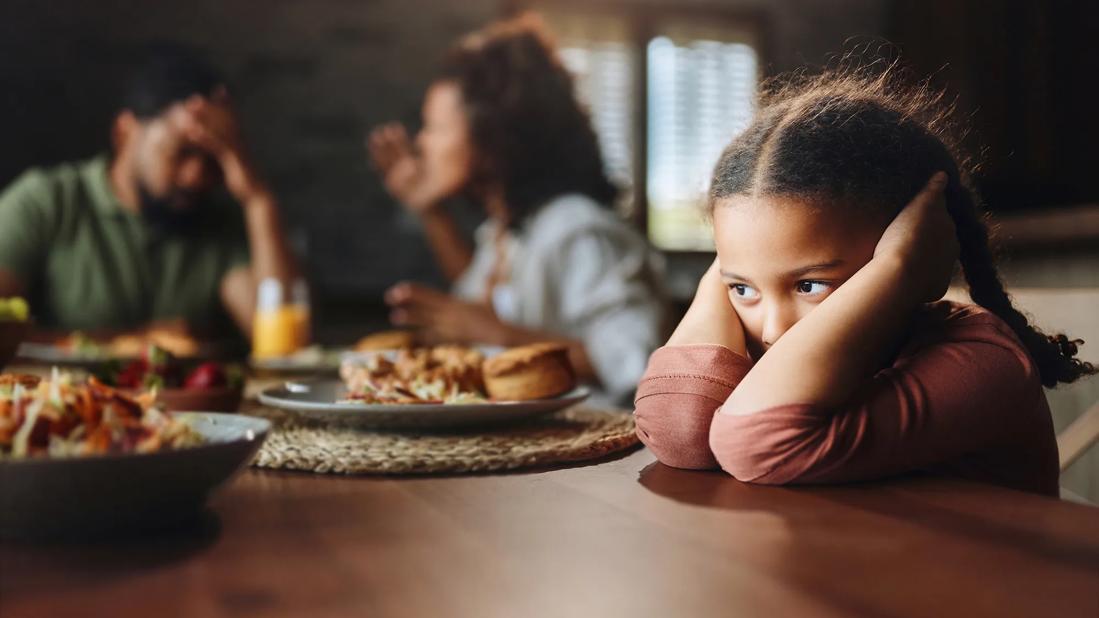Practicing mindfulness, building healthy relationships, establishing boundaries and seeking therapy can all help

Traumatic events don’t always leave physical scars. But they often leave emotional and psychological ones. And when those events happen in your childhood, their imprint can affect your mental and physical health for years to come, even into adulthood.
Advertisement
Cleveland Clinic is a non-profit academic medical center. Advertising on our site helps support our mission. We do not endorse non-Cleveland Clinic products or services. Policy
When something very scary or harmful happens to you as a child, it can make you feel upset or afraid for a long time. This includes things like getting hurt, seeing someone else get hurt, or living through a stressful or frightening experience.
Psychologist Kate Eshleman, PsyD, says that often, you can move on from traumatic events and thrive. But you may need a helping hand.
Dr. Eshleman explains how to identify childhood trauma and how to begin the healing process, no matter what stage you’re at.
Childhood trauma can affect everything from our mental to physical health. Because of this, it can be hard to pinpoint when an issue you’re experiencing is due to a traumatic event from your childhood.
There are several different types of childhood trauma that you can experience, including:
Here are a couple of ways that childhood trauma can manifest:
Sometimes, our body holds onto trauma more than our mind. “The body responds to emotional stress in much the same way it responds to physical stress,” Dr. Eshleman notes.
There are two main ways that trauma can cause those lingering effects:
Advertisement
Changes in behaviors are also a common sign of childhood trauma. You often see these changes right after the traumatic event occurs.
Typical behavior changes include:
Past traumas can stay with you for years to come. “Sometimes, significant stress or trauma can lead to mental health disorders, such as anxiety and depression,” shares Dr. Eshleman. And other medical problems related to your heart and weight can also arise.
These conditions can start to sneak up in childhood or later in adulthood. Children who experience traumatic events have a greater chance of developing health conditions, including:
It’s never too late (or too early) to begin the healing process for childhood trauma. Whether it’s right after the event or five or 10 or 20 years later, there are steps you can take to begin to heal.
Psychotherapy (talk therapy) can give you the tools and support you need to process your traumatic experiences. Often, trauma from childhood can be hard to face or even define. Different types of therapy can help you develop healthy coping mechanisms and feel more fulfilled in your everyday life.
Plus, therapy’s collaborative nature means the healing process is customized for you. Here are some of the types of therapy that are used to treat childhood trauma:
Advertisement
Does this mean therapy is a must for treating childhood trauma? Not always. But it’s highly recommended, especially if you’re experiencing things like:
Practicing self-compassion is a big part of the childhood healing process. But it can also take the longest.
Some specific self-care practices to try include:
Advertisement
A lot of times, triggers from our childhood can come up in our everyday lives. This could be a person, a situation or even a place that brings you back to the traumatic event.
Setting boundaries establishes a sense of safety, control and self-respect. If you or a loved one have experienced trauma, especially in environments where boundaries were violated or non-existent, learning to set and maintain boundaries can be empowering.
This can also help survivors of trauma define what’s acceptable and unacceptable in their relationships and interactions, which, in turn, protects you from further harm and reduces anxiety.
Many children who experience an adverse event don’t have long-lasting effects. But some factors increase the chance of later problems, Dr. Eshleman says, such as:
Advertisement
The good news is that help is available at any age. “It’s never too late to work with a mental health professional,” Dr. Eshleman reinforces.
Healing from childhood trauma is a journey that, while challenging, can be transformative and empowering. With the right support and resources, you can reclaim your life, rediscover your inner strength, heal your inner child, and build a future filled with hope and possibility.
By seeking out therapy, building healthy relationships and practicing self-compassion, you can find ways to process the effects of childhood trauma while embracing your present moment.

Sign up for our Health Essentials emails for expert guidance on nutrition, fitness, sleep, skin care and more.
Learn more about our editorial process.
Advertisement

Following routines, avoiding images and talking honestly, but age-appropriately, about what happened can help you and your family cope with a traumatic event

Through proper therapy, self-care and more, there is a path forward

Communicating clear limits helps protect your time, energy and emotional well-being

Being hooked on love can cause unhealthy relationship patterns and obsessive thoughts

Even small moments of time outdoors can help reduce stress, boost mood and restore a sense of calm

Exploring your hidden side can lead to better understanding of what makes you tick

Burnout is often driven by long periods of stress without time to recover — but practicing self-care and creating work/life boundaries can help

When someone guilt trips you, they’re using emotionally manipulative behavior to try to get you to act a certain way

Even small moments of time outdoors can help reduce stress, boost mood and restore a sense of calm

A correct prescription helps your eyes see clearly — but as natural changes occur, you may need stronger or different eyeglasses

Both are medical emergencies, but they are very distinct events with different causes